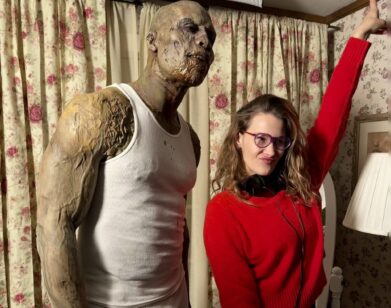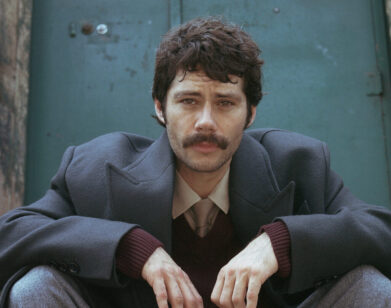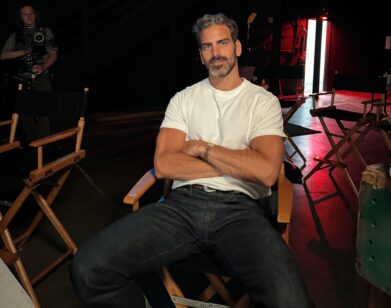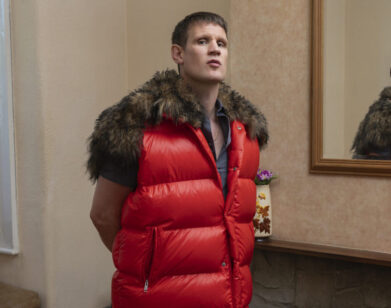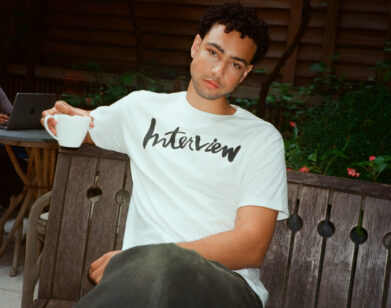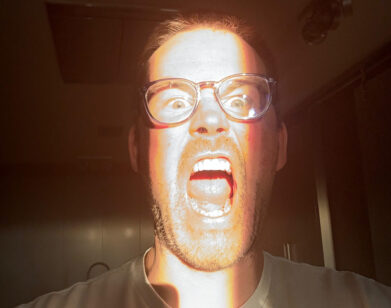Maren Ade’s Altered Egos
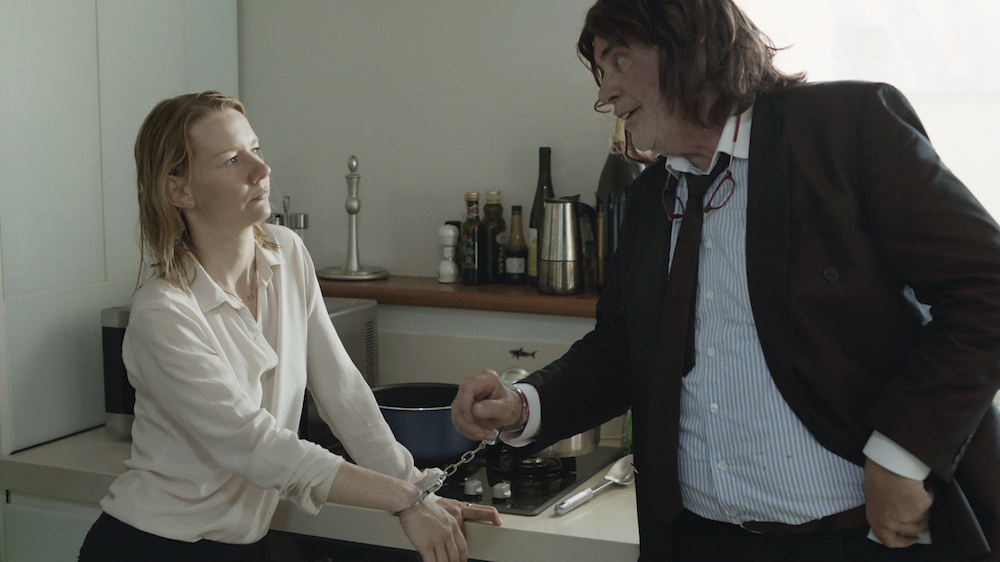
SANDRA HÜLLER AND PETER SIMONISCHEK IN SONY CLASSICS’ TONI ERDMANN.
Among the absurdist comedic set pieces presented by Maren Ade’s Oscar short-listed Cannes sensation Toni Erdmann—which include an all-nude birthday brunch; a reluctant performance of Whitney Houston’s “Greatest Love of All;” and the appearance of a Kukeri, the Bulgarian folk costume that reads part gorilla, part towering phallus—the most ridiculous and heart-wrenching may be the creation of the titular Erdmann. A bewigged, fake teeth-wearing “life coach” servicing the tangle of multinational companies in Bucharest, Erdmann is the Steve Coogan-esque invention of Winifried (Peter Simonischek), a dry-humored practical joker. Erdmann’s a desperate device, a last-ditch attempt for Winifried to reconnect with workaholic daughter Ines (Sandra Hüller), a corporate hatchet woman for a consultant company stationed in the post-Communist city. Ade, who both wrote and directed the film, crafts a delicate balance between poignancy and humor by slyly excavating the fraught emotional subtext between father and his grown daughter, to an extremely satisfying end.
Interview recently spoke with Ade in New York.
COLLEEN KELSEY: What came first for you creatively, was it the topic of a family dynamic, or a character with an alter ego?
MAREN ADE: In the beginning there was this character of the father, who was first this prankster dad. I have to say, also, my father has a very good repertoire in joking. Something that I really borrowed from him was, I once gave him as a present—20 years ago, I worked as a volunteer at the first Austin Powers premiere in Munich, and as a giveaway, they gave some fake teeth: the Austin Powers teeth. I had the feeling my father could use them. It really suited him, in a way, because it didn’t look too over the top. Sometimes he put them in standing at the traffic light, looking over to the other car, or when he wanted to say something very serious to us. I like this little moment of transforming. That was one thing, and then there was a longer interest I had in that family topic, family dynamics—doing something about children and parents. You can change so many things in your life, but you cannot change where you come from. It’s something that you have to deal with: the role everybody plays in his family, no matter if he likes it or not. So that was the general topic. Andy Kaufman was a big inspiration. And with the female character, there was a long period of research on that business world.
KELSEY: So how long did it take you to write the script?
ADE: All in all it was two years, or something. Also with Romania, I didn’t know Romania. I was traveling back and forth to get to know the locations. After one and a half years of writing I already started casting, and after knowing who would play it, I went back to writing again, so in the end it was really written for each location and really written for the actors, or at least adapted to them.
KELSEY: Why did Bucharest present itself as the right setting?
ADE: I was interested in Bucharest because I was a fan of the Romanian Wave of films. There’s also a connection in economy between Germany and Bucharest. After the fall of CeauÈ?escu, the end of Communism there, there was a big sellout, also a painful sellout for the country, because there’s a lot of multinational companies now. It was a good place to tell the story.
KELSEY: With Ines’s job and the location, was it inevitable that a political or sociological underpinning would come out?
ADE: I thought very long how to deal with that political side. I was interested in it. For me, it was always clear that it’s more a film about what globalization, capitalism, does with private relationships much more than making a “political” film. It’s more interesting to raise questions, because I don’t feel in a position to “make a statement” with the film. It became too complicated. It was always clear that between them a political conflict exists. He comes from a completely different generation, that, especially in Germany—because it’s the post-war generation, they were very politically engaged. They raised their children with a lot of human worldviews, sent them out in the world believing in a world without borders, and he’s confronted with what his daughter does in that world. For her, where he stands, it almost became naïve. I think they’re both not right, in a way, and they know it. I think it’s still an unsolved problem. [laughs]
KELSEY: Going back to what you said earlier—you can’t change where you come from—there is always the moment when you become an adult when you finally realize that your parents are not untouchable. She almost views herself as more of an adult in comparison to him.
ADE: She becomes the adult and he’s like the child. We talked sometimes about it, that it’s a change of roles in a way. It was also part of the idea that through this role-play, they get the chance to meet on eye-level as strangers, as two foreigners, as two adults. Because it’s so hard to escape these very written roles of what a father should be, father-daughter. So this was something I was interested in.
KELSEY: What were the qualities of Peter and Sandra that you tailored the roles to?
ADE: I always do casting for every role, even if it’s just one sentence. They’re both very good actors. They’re both famous theater actors. They’re both very radical actors. I like to work with theater actors because they’re used to a process. I think filmmaking sometimes can become so stiff. Sometimes I have the feeling that people come together praying in the morning that, “Let’s just shoot something, no matter what! Let’s just finish this day, no matter what we will tape!” [laughs] You know? So I tried to make it, that I can react to what I see, we can discover something. For this it worked very well, because they really enjoy playing with each other.
For Peter it was interesting because we also had to find Toni, not only Winifried. It was really a difficult role because there’s this Toni on one side, which is a very loud surface, but actually you have to see through to Winifried the whole time. That was a thin line we had to walk. Also with Sandra’s role, she was so good in the first casting, playing this very strong façade of this businesswoman, but still you could see through to her. It’s hard to do this without making it a cliché.
KELSEY: The balance of the tragic elements and the comic elements—it comes together so well, but it’s so difficult to get that balance. Was there anything on the page about how it would translate played out?
ADE: While I was shooting, I decided that I didn’t care if it will be a comedy. I had to be precise about what happens between them, and in a way, the comedy was written because the jokes were written. If someone is standing in the door naked… Often you also laugh because it’s awkward or something. So I had the feeling I had to stay focused on what’s lying under. A big part of the story in Toni Erdmann happens on the sub-level. On the surface, a lot of scenes, it’s banal. What’s happening? So, this naked party for example. It was always clear that the father, Toni, he’s doing it out of desperation. The boss standing on the door naked —it really has to be existential for him doing this. If the actor starts thinking, “Oh, I’m in a genre, I’m doing a comedy, I’m doing funny things,” then you lose [something].
KELSEY: Was the Whitney Houston song always going to be—
ADE: Her song? It was always this song. I wanted Whitney Houston and from her songs, I liked that one the most. So I tried to get the rights very early. I wanted to have a song where you immediately have a picture of them singing it together when she was young, and maybe at that time she forced him to play it over and over so she could practice or something. We rehearsed it before and it was a nice coincidence with that version, because we were a bit stuck on that shooting day. Luckily we taped a version that we did a bit for fun when we were rehearsing, a very over the top thing that [Hüller] called the “Las Vegas” version. A very ironic [version]. When you direct the dialogue you can be precise, but with a song as a director you’re more like a football coach. You can say one, two things in the beginning and then the actor has to follow what happens. And she was really throwing that thing out. [laughs]
KELSEY: Has working as a producer as well affected how you approach directing a project?
ADE: I have a company together [Komplizen Film] with two colleagues. We believe very much in the writer-director and in the freedom of a filmmaker. I think it’s always good to be involved where you spend the money. Filmmaking, you see in the picture what the money’s spent for. I never had to leave a phase of filmmaking before being really happy, and that was really a big luxury. That could happen, I think, because I am my own producer.
TONI ERDMANN IS OUT IN LIMITED RELEASE NOW.

